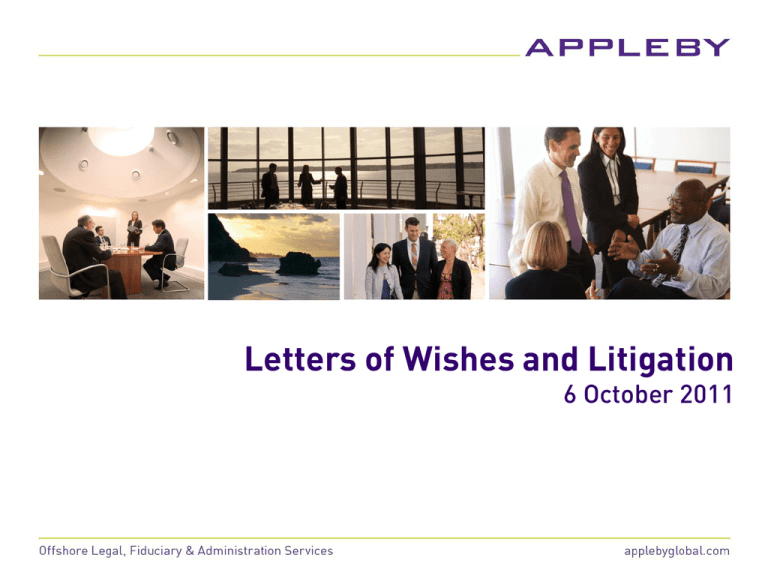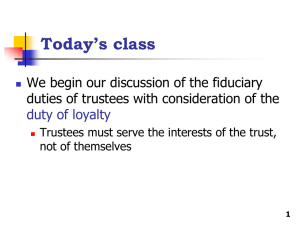here - Stepbermuda.org
advertisement

Letters of Wishes and Litigation 6 October 2011 Keith Robinson Counsel Litigation & Insolvency Bermuda In Outline • Categorization of Letters of Wishes • Refresher on law of disclosure of documents to beneficiaries • Focus on Letters of Wishes and how they “fit” into the general law • Case study: Breakspear v. Ackland Categorization • What we talk about when we talk about “Letters of Wishes” • Signed Letter? • Or Unsigned Memorandum? • The question of medium Letters of Wishes - Status • Trustee are entitled to take into account Settlor’s wishes – see Re Manisty’s Settlement [1974] • Must a trustee do so? • No clear answer in case law Status – Some Cases • Jersey Royal Court– Re Rabaiotti’s Settlement [2000] • Definition: “… a document addressed by a settlor to trustees which is not binding upon the trustees, but which indicates the settlor’s thoughts and wishes as to how the trustees might exercise their discretionary powers” [para 34] • “It is an informal document which the trustees are free to ignore. It is merely an expression of the settlor’s wishes” [para 45] (emphasis added) Status – Some More Cases • New Zealand High Court • Kain v. Hutton [2005] • “The legal position with reference to a statement or letter of wishes is clear, namely that trustees must take serious account of the settlor’s wishes but always appreciating that the ultimate decision is theirs. It follows that trustees may properly decide to act contrary to the settlor’s wishes after taking account of all the relevant circumstances” Status – Yet More Cases • Australia – NSW Court of Appeal • Hartigan Nominees v. Ridge [1992] • Letter of Wishes was “an essential component of, or companion to, the trust deed itself” Status – Some Conclusions • Better view is that trustees are bound to have regard to Letter of Wishes • Lewin “… the notion that the trustees may be entitled to take [a Letter of Wishes] into account but not bound to do so is in our view wrong, for it is either a relevant consideration which ought to be taken into account or an irrelevant one which should not” Disclosure to Beneficiaries • Need to distinguish between: • (a) Disclosure in hostile trust litigation; and • (b) Disclosure to beneficiaries on demand and Court’s supervisory control over this process in cases of dispute. Disclosure in Hostile Litigation • Normal rules of civil litigation (“discovery”) apply in trust cases namely proceedings by beneficiaries against trustees challenging their decisions or otherwise making a breach of trust claim against the trustees • Order 24, Rule 1 of the Rules of the Supreme Court “… there shall… be discovery by the parties to the action of the documents which are or have been in their possession custody or power relating to matters in question in the action” (emphasis added) • In general, the confidential nature of a document is not a ground for resisting discovery – the test is relevance • In hostile litigation, relevant Letters of Wishes will be provided to the opposing parties (beneficiaries) as part of the discovery process Disclosure on Demand by Beneficiaries I • Schmidt v. Rosewood Trust [2003] • A beneficiary has a right to seek disclosure of trust documents • If refused by trustee, the beneficiary can apply to the Court which may or may not intervene • The right to seek the Court’s intervention is an aspect of the court’s inherent jurisdiction to supervise and where appropriate intervene in the administration of trusts Disclosure on Demand by Beneficiaries II Court may have to form judgment on: • Whether a discretionary object should be granted disclosure • What class of documents should be disclosed • What safeguards should be imposed, e.g. undertakings, redaction etc. Breakspear v. Ackland [2009] - Facts • Settlor’s Letter of Wishes contemporaneous with settlement • Beneficiaries of the trust were the settlor and his children • The claimants were three of his children. They asked for disclosure of the Letter of Wishes in order to evaluate their prospects • Trustees refused on grounds that the Letter of Wishes was confidential and that disclosure would cause family strife Breakspear v. Ackland – Decision (1) • Judge relies upon what he calls the Londonderry Principle “the process of the exercise of discretionary dispositive powers by trustees is inherently confidential, and that this confidentiality exists for the benefit of beneficiaries rather than merely for the protection of the trustees”. • Flows from the Londonderry Principle that certain classes of documents will generally not be ordered to be disclosed – in particular, documents relating to or revealing the reasons for trustees’ decisions on the exercise of their powers and discretions Breakspear v. Ackland – Decision (2) • “The defining characteristic of a wish letter is that it contains material which the settlor desires that the trustees should take into account when exercising their (usually dispositive) discretionary powers. It is therefore brought into existence for the sole purpose of serving and facilitating an inherently confidential process” • A Letter of Wishes “is itself properly regarded as confidential” Breakspear v. Ackland – Decision (3) • “… the confidence which ordinarily attaches to a wish letter is such that, for the better discharge of their confidential functions, the trustees need not disclose it to beneficiaries merely because they request it unless, in their view, disclosure is in the interests of the administration of the trust, and the discharge of their powers and directions” • “The confidentiality which vests in a Letter of Wishes is something given to the trustees for them to use on a fiduciary basis. Once given to the trustees by the settlor, the question of disclosure is one for the trustees (or the court) and not the settlor” Breakspear v. Ackland – The Result • Thus, in general, it will often be appropriate for a trustee to refuse disclosure of a Letter of Wishes • Generally, the Court can be expected not to overturn a decision by the trustees not to disclose in the absence of evidence of bad faith or unfairness • However, on the facts of Breakspear v. Ackland, the English court ordered disclosure Why? • The trustees were intending to seek the sanction of the court for a scheme of distribution • In doing so, the trustees would, in due course, have disclosed the Letter of Wishes as a key document relevant to the proposed distribution • The risk of family conflict as a result of disclosure was outweighed by the need to give the family a proper opportunity to address the court on the question of sanction Some Conclusions • Letters of Wishes are going to continue to be particularly sensitive documents in the hands of trustees • There is no blanket rule against disclosure to beneficiaries • In some cases disclosure will be appropriate and may be ordered if the Court’s supervisory jurisdiction is invoked Finally • Questions • Refreshments









